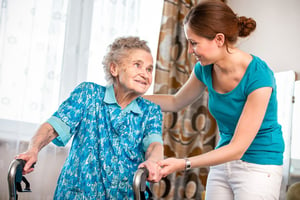When a loved one has suffered a heart attack or undergone a heart bypass, concern is understandably...
Spotting a Senior at Risk
An elderly family member or neighbor seems different lately. Is she just having a bad day, or is it something more? Amy Silbaugh, Visiting Nurse Association of Ohio’s manager of clinical development, said there are several warning signs that a senior might be at risk and in need of help.
Indicators That a Senior Might be at Risk Include:
* General decline in hygiene and personal care. Seniors who stop shaving or combing their hair – or those who seem to be unwashed and wearing the same clothes day after day – may be depressed or simply have forgotten their grooming habits.
* Sudden weight loss. Seniors may stop cooking for themselves, and eventually they may not bother to eat at all. Silbaugh suggests checking a senior’s refrigerator during visits. An empty refrigerator is a sign of trouble.
* Change in habits. A person who has always been punctual may begin showing up late or missing appointments altogether. Someone who has always been neat and organized may be leaving housekeeping chores undone. These would be causes for concern.
* Change in mental status. During conversation, seniors may have trouble finding words. They may have trouble remembering things they should, such as the names of their children or their address.
Some of these signs might suggest the onset of Alzheimer’s/dementia, but those aren’t the only mental health conditions that affect seniors, Silbaugh said. Depression and anxiety are common among older clients, and they should be diagnosed and treated just as any other disease, she said.
Many times, a change in a senior’s mental health is triggered by a “sentinel event.” These events could include the death of a spouse or a change in living arrangements, Silbaugh said.
“A lot of elders we see now are losing their homes,” she said. “They have moved to an apartment or assisted living facility, and they get very depressed. They don’t want to do what they used to do. They isolate because of grief.”
Silbaugh said those who observe any of the warning signs in a neighbor or friend should alert the person’s family. But, she said, anyone who is concerned about a senior’s well-being can call VNA of Ohio directly at 1-877-698-6264 or contact their county’s Adult Protective Services agency.
Call VNA of Ohio Today
Learn more about VNA of Ohio services, or call us today at 1-877-698-6264.



